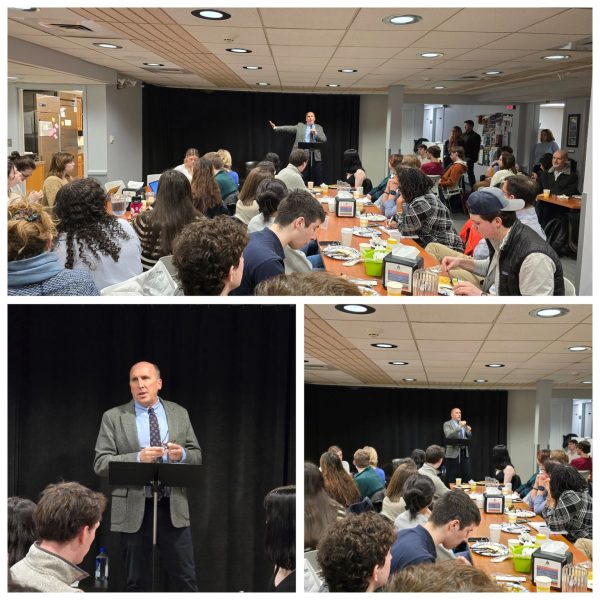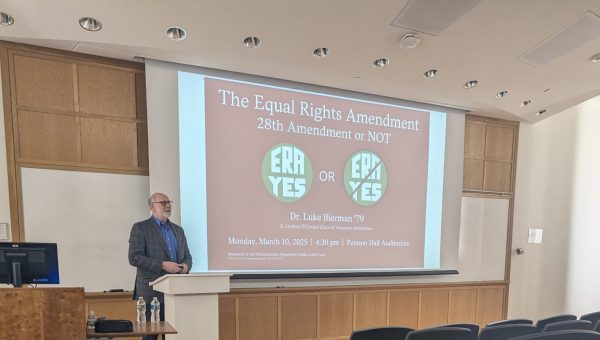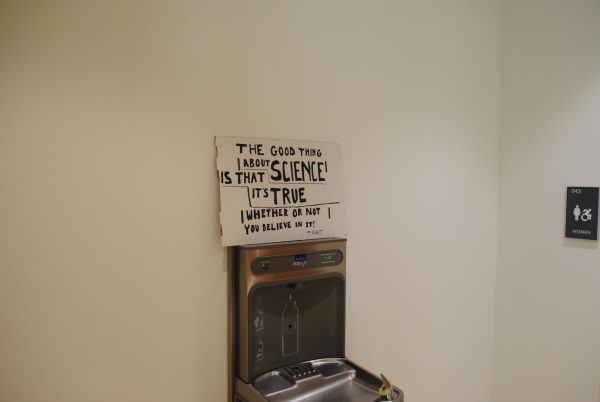SGA Presidential Elections: Week Preceding Election Includes Debate and Town Hall Forum
In the week preceding the Student Government Association (SGA) Presidential and Vice Presidential election, the SGA hosted a “Town Hall Forum” and a separate debate between the two campaigns. The Town Hall Forum took place on Tuesday, March 29 in the Curtis Commons, while the debate was held on Thursday, March 31 in Love Auditorium.
Two tickets are on the ballot for this year’s election. The candidates are juniors Matt Swain and Iris Kang for President and Vice President, respectively, and juniors Daniel Berry and Natalie Pudalov for President and Vice President, respectively.
Voting closed Wednesday, April 6. As of press time, the results of the election had not yet been announced.
Sophomore Elections Commissioner Alison Sheehan explained SGA’s goals in creating a Town
Hall Forum.
“The Town Hall Forum serve[d] as a meet and greet for the candidates to discuss their platforms with students,” Sheehan said.
At the forum, both campaign platforms, taken directly from the candidates’ websites, were displayed on two screens, and students were invited to ask questions and speak with the candidates.
When asked how he would describe his and Pudalov’s campaign, Berry provided a brief overview.
“Natalie’s and my campaign is truly about being inclusive to all students. We are in favor of individuals finding communities on campus, we just want to make sure that it is equitable for all students to do so. Also, in hosting events, organizations need to be treated equitably regardless of their affiliation,” Berry said.
Berry also discussed his campaign’s emphasis on mental health policies
at Colgate.
“We’re also heavily involved in the campus community, especially in taking initiative on mental health, and we want to prioritize that in our campaign,” Berry said.
When asked about his and Kang’s campaign, Swain also provided an overview.
“We’re pro-social change, pro-athletics, pro-tradition, pro-Greek. That would be the best way to summarize our campaign,” Swain said.
Swain expressed that he was happy that SGA was holding an event open to all students so that anyone could learn more about both tickets and create awareness about the debate on the following Thursday.
“One of the biggest things now is that it’s awkward to approach Senate, or write in and ask questions – we want to change that. SGA and the senate should represent and hear the voice of every student on this campus, especially minority voices, and in its current format it does not do that,” Berry said.
First-year David Zevallos explained why he decided to attend the forum.
“I came on behalf of Senate and because I know the candidates pretty well because I work closely with them in SGA. Before this, I messaged both of them on Facebook to understand their stance on social hosting policies and I received a lot of feedback,” Zevallos said.
Senior Daniel Foussard spoke to his motivation for joining Swain and Kang’s campaign team.
“As a senior, I’m not going to be here next year, but I thought it was important to try to leave as much of what I love about Colgate after my time here. I look forward to being a liaison between recent alumni and the SGA to represent and promote Colgate’s vision,” Foussard said.
First-year senator Molly Nelson provided insight into who she might vote for in the election.
“Currently I’m leaning towards Swain and Kang because I’ve personally worked with them on SGA and I haven’t had much interaction with the other candidates. But I am really waiting for the debates to decide,” Nelson said.
Two days later, the two campaigns participated in the SGA-sponsored debate in Love Auditorium. The debate was moderated by sophomore Senate members Andrew DeFrank and Derek Baker.
Both campaigns began with their opening statements, and the candidates proceeded to introduce themselves while detailing their relevant leadership experience. Introductions were followed with statements about their campaign platforms, and both pairs of candidates addressed what they hoped to accomplish if elected President and Vice President.
Swain began by introducing himself as an Environmental Studies concentrator with a minor in Economics. He spoke about his experience in SGA starting his first year and his leadership as President of the Class of 2017 for two years. Swain highlighted that their campaign is not necessarily just about maintaining traditions but rather focusing on forging new ones.
Swain’s running-mate Kang said that the pair wants to improve the process of course registration and reevaluate the CORE curriculum to ensure that it includes cultures and perspectives beyond the Western world. Swain added that he and Kang want to create more student parking up the hill and will seek to increase attendance at athletic events, especially those involving Colgate’s female athletic teams. Swain concluded his opening statement by explaining that while they cannot institutionalize inclusivity overnight, his campaign will make it one of their top priorities if elected.
Berry then introduced his team’s platform and mission. He told the audience that he is a double concentrator in Peace and Conflict Studies and Studio Art. He spoke about his involvement in SGA since his sophomore year as a senator, and his current role as the SGA liaison to student organizations. Berry highlighted that he has passed over 15 bills and worked to recognize 20 organizations this year.
Pudalov introduced herself as a Peace and Conflict Studies concentrator with a minor in Biology, and spoke about her experience in SGA as a senator and the press secretary for the Executive Board. Berry and Pudalov discussed prioritizing mental health initiatives, revising social hosting policies to make them equitable for all students and reevaluating the standards of the Residential Learning Commons (RLC) program.
After opening statements, DeFrank and Baker posed questions to the candidates that included the issue of transparency between students and the administration, how they will attempt to achieve their platform goals and why they chose their running mates.
Both Presidential candidates cited lack of communication with the administration as a big problem on campus. Swain said that he wants to add to the current format of SGA’s online presence and accessibility by putting out weekly updates on social media apps that students will actually see. Berry explained that they want to hold monthly meetings to encourage students to voice their opinions and also publicize senate meetings so that students have the option of listening in.
When asked what they would implement first from their platform, Pudalov answered that she and Berry would work with the Counseling Center to prioritize a mental health initiative. Kang said that she and Swain would address the CORE curriculum to implement a global history aspect to further inclusivity and create a more holistic learning experience.
The moderators asked both candidates what they would do about concern over the 2014 sit-in and the 2015 sexual assault protest. Both candidates agreed that as SGA leaders, they must encourage open dialogue and amplify student voices.
“All students, regardless of identity, should be able to feel safe in a multitude of spaces. We want to make sure that all students’ voices are heard and receive all the recognition they deserve,” Berry said.
Swain also discussed the Budget Allocations Committee (BAC), which distributes funds to student activities that are recognized by the SGA.
“Having knowledge from the BAC, I know how the funding works, and how unfair that process can be. Our platform addresses that with BAC reform,” Swain said.
In a question initially directed at Berry and Pudalov, the moderators asked what “pro-community” means, as compared to “pro-Greek.” Berry responded that he and Pudalov are not anti-Greek and support organizations that foster bonding. But they want the school to address all communities on campus equitably.
Kang responded to the question by clarifying their stance of “pro-Greek.” She explained that pro-Greek does not mean pro-exclusivity; instead, by including pro-Greek on their platform, it means that they understand that when communities such as Greek Life are utilized correctly they can be largely beneficial.
The moderators then posed the question, “In what specific ways do you believe your ticket is qualified to be President and Vice President?”
Swain answered first by explaining that both he and his running-mate have multifaceted experience that can foster a stronger community and rid the BAC of inefficiencies. Pudalov said that as senators, liaisons and authors of several bills, both she and Berry have extensive knowledge of how the system works and want to use that to the advantage of students.
Current President senior Kegan Thompson and current Vice President senior David Kim were each allowed to pose one question to the candidates.
Kim asked, “Marginalization occurs on a daily basis on our campus. Can you give me three ways in which you would address this problem?”
Berry answered first saying he would try to make the executive board more diverse, hold monthly meetings that would encourage dialogue between SGA, students and administration, and publicize Senate events so that students are able to attend.
Kang explained that they would also strive to diversify the executive board. Swain added that they would work to facilitate conversations on campus and bring student voices to the BAC.
Thompson asked each ticket how they plan to handle the responsibility of being President and Vice President and if they plan to make sacrifices for this job.
Swain and Kang both answered that they will sacrifice their current extracurriculars to serve the student body. Berry answered that he is currently working 15 hours a week, and he will give up his job to dedicate all of his time to serving as President. Pudalov explained that she does not know the answer, but she wants to learn from the current President and Vice President as to how they handled it.
Senior Harry Quinton expressed his thoughts about the debate.
“Both candidates presented a lot of solid information on their platform, but to me personally, I think the substance of Matt and Iris’s campaign really stood out. Their executive experience and experience in executing in the BAC really appealed to me. My mind wasn’t made up going into this, but after hearing Matt and Iris’s points and the cool ideas they have, which I know now their experience can deliver on, I’m a decided voter,” Quinton said.
Junior Will D’Avino discussed what he would like SGA to do in the future.
“As a member of senate, I know about a lot of the programs to help students that Colgate pays for a subscription to, and I feel like the majority of students don’t know about them. I think it’d be great if SGA made a way for that to be more accessible,” D’Avino said.






